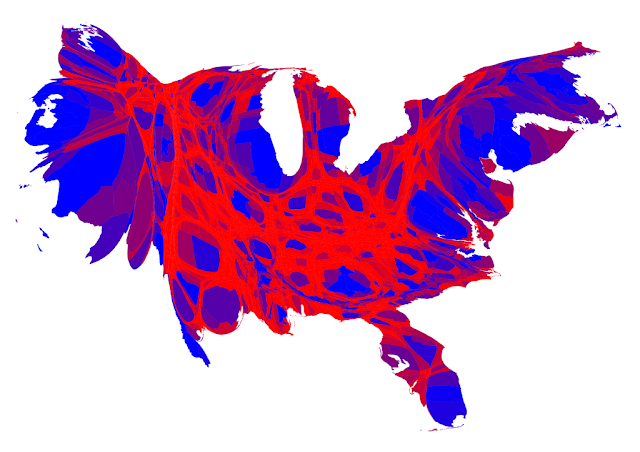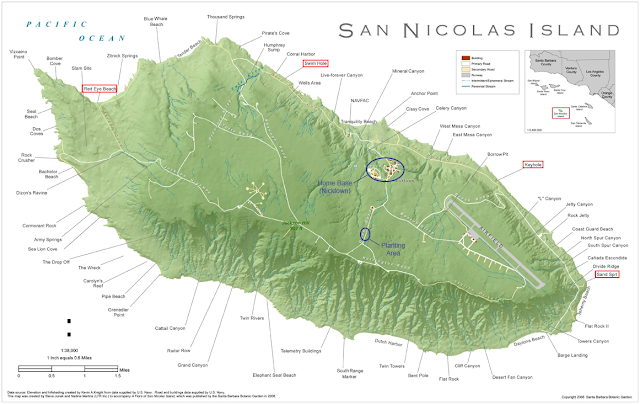Asymmetrical
The fate of this country - perhaps the fate of the entire world - will be decided by white Americans. When the media talks about America being "deeply divided," they mean white America. Americans of color may not be unanimous on anything, but you can't say they're "deeply divided" when ninety percent or so are on the same side.
The fate of the entire world? Seriously? Yes, seriously. Most times, that would be hyperbole, but in this case one of the things at stake is control of enough nuclear firepower to blow up civilization several dozen times over. What's also at stake is control of an economy large enough for its energy choices to tip the global climate balance one way or another. So yes, the fate of the world. Seriously.
My fellow white Americans, it's all on us.

Again and again lately, I've been hearing and reading commentators saying that the people Red State Americans really don't like are... white Blue State Americans. The "coastal elites," although many of them live in Chicago or Austin or Charlotte or other places nowhere near the coast. The educated urban America. And what is that Red State America doesn't like? Judging from what's been said lately, the Blue State Americans are just too darn mean, and they're always hurting the Red State Americans' feelings.
In a recent C-SPAN interview, David Frum told us that the last thing down-and-out white working class people need to hear is how privileged they are. David Brooks recently told us, "the Reds feel shamed by the Blues to a much greater degree than the Blues realize." And "Tiger Mother" author Amy Chua recently told us, "this group of whites are now viewed by a lot of people inside the middle of America as traitors. As in, 'These aren't real Americans. They love minorities. They love foreigners better. They only want to bring in immigrants. They like the poor of Africa better. They don’t care about real Americans.'"
Remind me again which side calls the other side "snowflakes?"
I'm not insensitive to what Red State America is going through. I see it when I go back east to visit my family. They love the lives they have, and they don't want to change - but the change is visible all around them, in the vacant storefronts and the shuttered factories and the growing number of jobless people hooked on opioids. They love thinking of their country as the greatest in the world, and they don't like having that view challenged - but the challenges are there, in the endless and futile "war on terror," or the emergence of other world powers like China. And many of them really don't understand the institutional racism that keeps white people on top. Many have never even met enough people of color to recognize them as fellow human beings, and not as some kind of menacing "other." So they don't understand why they need to make scary changes - but at the same time they don't like being thought of as "bad people."
We on the other side of that divide face a tough challenge, because we can't just dismiss our Red State countrymen. They are fellow Americans and fellow human beings. In many cases, they are our friends and family. We can't just brush them off, we can't conquer them militarily, and we can't send them away. We have to act with compassion, but that's not always easy to do.
Compassion can only go so far when there's a clear and present danger involved. Red State Americans say they feel like their culture is being threatened if they can't carry guns around. Okay, fine - but we're talking about lethal weapons, not designer clothing. Cultural sensitivity shouldn't take priority over other people's right not to be shot.
Compassion can only go so far when it enables and encourages magical thinking. I get that people don't want to make hard changes that will cut carbon emissions, but being sensitive won't stop the global climate from changing. I get that people can be nostalgic for the Good Ol' Days, but being sensitive doesn't mean denying things are different now.
And compassion for Red State Americans can't take priority over compassion for other people. I get that learning how to live and work with people very different from yourself can be a hard adjustment. It can be uncomfortable at first. But sensitivity to their discomfort can't mean trampling on the people who make them uncomfortable. They have rights too, and we must respect those rights or we will turn into monsters.
I feel like Frum, Brooks, Chua and others are telling us we've got a well-armed, short-tempered, delusional neighbor on our block, and we'd better tread lightly and watch what we say or we'll suffer the consequences. That's no way to live. It's certainly no way to run a country.
We are engaged in "asymmetric warfare" for the soul of this country, while the rest of the world watches anxiously. We face an adversary that frequently opts for fear and hatred over compassion and understanding, that has already resorted to violence and is likely to do so again, and yet we must not choose fear or hatred or violence ourselves. Some people are probably beyond the reach of mere mortals like ourselves, but reconciliation is still possible with a great many people, and we must somehow avoid scaring them away.
How exactly do we make that work? I'm open to suggestions.
The fate of the entire world? Seriously? Yes, seriously. Most times, that would be hyperbole, but in this case one of the things at stake is control of enough nuclear firepower to blow up civilization several dozen times over. What's also at stake is control of an economy large enough for its energy choices to tip the global climate balance one way or another. So yes, the fate of the world. Seriously.
My fellow white Americans, it's all on us.

Again and again lately, I've been hearing and reading commentators saying that the people Red State Americans really don't like are... white Blue State Americans. The "coastal elites," although many of them live in Chicago or Austin or Charlotte or other places nowhere near the coast. The educated urban America. And what is that Red State America doesn't like? Judging from what's been said lately, the Blue State Americans are just too darn mean, and they're always hurting the Red State Americans' feelings.
In a recent C-SPAN interview, David Frum told us that the last thing down-and-out white working class people need to hear is how privileged they are. David Brooks recently told us, "the Reds feel shamed by the Blues to a much greater degree than the Blues realize." And "Tiger Mother" author Amy Chua recently told us, "this group of whites are now viewed by a lot of people inside the middle of America as traitors. As in, 'These aren't real Americans. They love minorities. They love foreigners better. They only want to bring in immigrants. They like the poor of Africa better. They don’t care about real Americans.'"
Remind me again which side calls the other side "snowflakes?"
I'm not insensitive to what Red State America is going through. I see it when I go back east to visit my family. They love the lives they have, and they don't want to change - but the change is visible all around them, in the vacant storefronts and the shuttered factories and the growing number of jobless people hooked on opioids. They love thinking of their country as the greatest in the world, and they don't like having that view challenged - but the challenges are there, in the endless and futile "war on terror," or the emergence of other world powers like China. And many of them really don't understand the institutional racism that keeps white people on top. Many have never even met enough people of color to recognize them as fellow human beings, and not as some kind of menacing "other." So they don't understand why they need to make scary changes - but at the same time they don't like being thought of as "bad people."
We on the other side of that divide face a tough challenge, because we can't just dismiss our Red State countrymen. They are fellow Americans and fellow human beings. In many cases, they are our friends and family. We can't just brush them off, we can't conquer them militarily, and we can't send them away. We have to act with compassion, but that's not always easy to do.
Compassion can only go so far when there's a clear and present danger involved. Red State Americans say they feel like their culture is being threatened if they can't carry guns around. Okay, fine - but we're talking about lethal weapons, not designer clothing. Cultural sensitivity shouldn't take priority over other people's right not to be shot.
Compassion can only go so far when it enables and encourages magical thinking. I get that people don't want to make hard changes that will cut carbon emissions, but being sensitive won't stop the global climate from changing. I get that people can be nostalgic for the Good Ol' Days, but being sensitive doesn't mean denying things are different now.
And compassion for Red State Americans can't take priority over compassion for other people. I get that learning how to live and work with people very different from yourself can be a hard adjustment. It can be uncomfortable at first. But sensitivity to their discomfort can't mean trampling on the people who make them uncomfortable. They have rights too, and we must respect those rights or we will turn into monsters.
I feel like Frum, Brooks, Chua and others are telling us we've got a well-armed, short-tempered, delusional neighbor on our block, and we'd better tread lightly and watch what we say or we'll suffer the consequences. That's no way to live. It's certainly no way to run a country.
We are engaged in "asymmetric warfare" for the soul of this country, while the rest of the world watches anxiously. We face an adversary that frequently opts for fear and hatred over compassion and understanding, that has already resorted to violence and is likely to do so again, and yet we must not choose fear or hatred or violence ourselves. Some people are probably beyond the reach of mere mortals like ourselves, but reconciliation is still possible with a great many people, and we must somehow avoid scaring them away.
How exactly do we make that work? I'm open to suggestions.



Comments